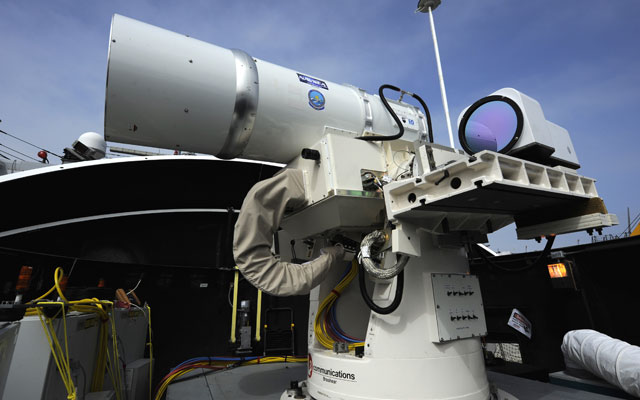The U.S. Navy shot down an unmanned aerial vehicle on Monday in a test of its Laser Weapon System (LAWS). This test was a positive step not only for combating air and missile threats but also for cost-effective weapons systems.
The laser, onboard the USS Ponce in the Persian Gulf, uses advanced laser and sensor technologies to track, target, and hit threats from the air, such as enemy aircraft. The Navy hopes to advance this capability to the point where it can shoot down certain missile threats as well.
Many of LAWS’s potential benefits come not just from its capability but in cost savings. Since lasers require only an electricity source to use them, ships will not have to carry as many explosives and heavy munitions. Furthermore, as Chief of Naval Research Rear Admiral Matthew Klunder stated:
Our conservative data tells us a shot of directed energy costs under $1. Compare that to the hundreds of thousands of dollars it costs to fire a missile, and you can begin to see the merits of this capability.
Any savings the Navy can find will become increasingly important as defense budget constraints put increasing pressure on each of the armed services.
One of the purposes of sailing the Ponce to the Persian Gulf is to test LAWS in the region with Hamas, Iran, and other potential threats looking on. Iran’s continued pursuit of a nuclear weapon capability and Hamas’s attempts to strike Israel with cruise missiles illustrate that these are real threats. The Navy needs to continue to mature the program to the point that it deters adversaries from even considering firing on U.S. citizens or property.
One of the biggest threats to such ground-breaking technologies comes not from a U.S. adversary but the White House. The Obama Administration cancelled the Airborne Laser, Multiple Kill Vehicle, and Kinetic Energy Interceptor programs and proposed $1.6 billion in cuts to missile defense in fiscal year (FY) 2010 compared to the prior year’s budget estimate.
With the release of Obama’s FY 2014 budget request, Congress needs to make sure that programs such as LAWS are sufficiently funded. This should be a no-brainer, as they are economical as well as highly effective. States such as North Korea and Iran continue to develop their ballistic missile capabilities, and it is critical that the U.S. remain a step ahead of such threats.

























